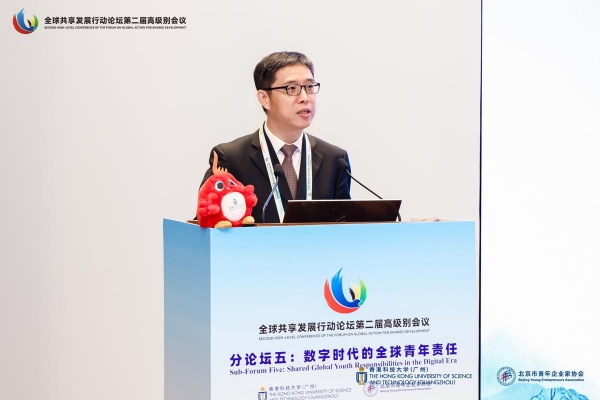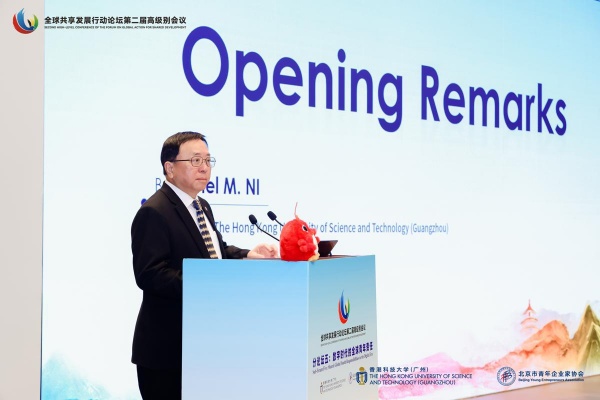
- Home
- Media Center
-
Events
- Wuzhen Summit
- Regional Forums
- Practice Cases of Jointly Building a Community with a Shared Future in Cyberspace
- World Internet Conference Awards for Pioneering Science and Technology
- The Light of Internet Expo
- Straight to Wuzhen Competition
- Global Youth Leadership Program
- WIC Distinguished Contribution Award
- Membership
- Research & Cooperation
- Digital Academy
-
Reports
- Collection of cases on Jointly Building a Community with a Shared Future in Cyberspace
- Collection of Shortlisted Achievements of World Internet Conference Awards for Pioneering Science and Technology
- Reports on Artificial Intelligence
- Reports on Cross—Border E—Commerce
- Reports on Data
- Outcomes of Think Tank Cooperation Program
- Series on Sovereignty in Cyberspace Theory and Practice
- Other Achievements
- About WIC
- 中文 | EN

Youth recognized as key players in global digital development

Yang Weiqun, vice-chairman of China International Development Cooperation Agency, addresses the forum on July 13, 2024 in Beijing. [Photo provided to chinadaily.com.cn]
Young people exert significant influence in promoting global sustainable development by driving digital technology innovation and digital economic development, officials and experts told a forum held in Beijing on Saturday.
"Digital development is the trend of today, and youth are the future of the world. With the current acceleration of the new round of technological revolution and industrial transformation, new technologies and applications such as artificial intelligence, big data and the internet are driving the future and have far-reaching value in the progress of human civilization," Yang Weiqun, vice-chairman of the China International Development Cooperation Agency, stated in an address to the forum, titled Uniting Generations: Shared Global Youth Responsibilities in the Digital Era.
The forum was a parallel event held during the second High-level Conference of the Forum on Global Action for Shared Development, and was organized by the Hong Kong University of Science and Technology(Guangzhou) and the Beijing Youth Entrepreneurs Association, attracting around 250 international participants including officials, experts, scholars and industry pioneers. The event aims to establish a platform for exchanging ideas and sharing experiences, delving into the responsibilities and challenges faced by global youth in the era of digital economy, and collectively seeking effective pathways to promote digital equality and achieve shared development.
"We are in the thick of the digital age. It brings opportunities and challenges that never before existed," said Lionel Ni, president of the Hong Kong University of Science and Technology(Guangzhou).
"The technological revolution has changed the way we live, the way we work and the way we communicate. Whether you like it or not, the digital revolution has brought the world closer together. At this technological turning point, we also find ourselves at a crossroads in a world complicated by tensions and conflicts. I believe, as an educator, that freedom comes with responsibilities to be fair, to be truthful, to be inclusive, to be ethical. We can begin again by guiding our young people toward embracing an inclusive world as its future leaders," Ni said.

Lionel M. Ni, president of HKUST(GZ), delivers a speech at the forum held in Beijing on July 13, 2024. [Photo provided to chinadaily.com.cn]
According to Ni, the university is dedicated to four main initiatives: offering scholarships to students from member countries from the Group of Friends of the Global Development Initiative and the Global Development Center of the cooperation agency for innovation and entrepreneurship; hosting the China-Europe Innovation & Entrepreneurship Forum in Germany; sharing education reform research for quality enhancement and sustainable development; and organizing the 2025 and 2026 Youth in Global Development sub-forums to help nurture talent in the Greater Bay Area.
Arken Arystanov, chairman of the board of the Kazakhstan Agency of International Development, said: "Kazakhstan is advancing digital equality and access to education in the region, while also fostering cultural and humanitarian cooperation."
"As a relatively new emerging donor and middle power country in development, Kazakhstan has been striving to strengthen cooperation and coordination with other donors, both traditional and emerging, to enhance the capacity of its development initiatives," he said.
Arystanov noted his country has conducted several programs aimed at enhancing public administration, medical education and diplomatic ties, with annual participation from partner countries and donors.
The forum also featured a roundtable meeting during which entrepreneurs discussed how digital technology empowers youth development.
Li Jiaqi, vice-dean of iFlytek Beijing Research at iFlytek Co, shared insights into key trends in the AI industry, including boosting computing power for large models, enhancing efficiency and reducing training costs.
"Despite concerns that AI may replace human jobs, in reality it brings new opportunities for entrepreneurs and various industries," Li said, noting that sectors such as industry intelligence, multimodal development, intelligent customer service and content creation have shown great development prospects and business opportunities.
Steve Jo, who is from South Korea and serves as the general manager of SK Networks (Xiamen) Steel Processing Center, said the rise of AI is an unstoppable global trend. Jo noted that in countries such as China and South Korea, numerous enterprises are actively pursuing technological innovation through AI, "and this advancement is poised not only to differentiate nations, regions and generations, but impact job displacement concerns among the youth."
"I hope that our young people, with enthusiasm and a spirit of challenge, actively utilize the trends, grasp new employment opportunities well, and make significant contributions not only to their own countries but also to the long-term development of humanity," Jo said.

The World Internet Conference (WIC) was established as an international organization on July 12, 2022, headquartered in Beijing, China. It was jointly initiated by Global System for Mobile Communication Association (GSMA), National Computer Network Emergency Response Technical Team/Coordination Center of China (CNCERT), China Internet Network Information Center (CNNIC), Alibaba Group, Tencent, and Zhijiang Lab.





